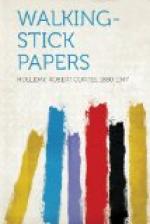Why should we speak the very excellent language spoken in the tight little isle across the sea? In Surrey they speak of the “broad Sussex” of their neighbours in the adjoining county. Is it exactly that we caun’t? Or that we just don’t? Because we have an article more to our purpose, made largely from English material, but made in the United States?
XIV
HUNTING LODGINGS
Some people say that it is the most awful trial.
But it isn’t so at all.
One of the most entertaining things that can be done in the world, so full of interesting things, is to go hunting lodgings. Also, it is one of the most enlightening things that can be done, for, pursued with intelligence and energy, it gives one an excellent view of humankind; that is, of a particularly human kind of humankind. It is a confoundly Christian thing to do—hunting lodgings—because it opens the heart to the queer ways, and speech, and customs of the world.
Now, I myself hunt lodgings as some men hunt wild game.
Nothing is better when one is out of sorts, somewhat run down, and peevish with the world generally than to go out one fine afternoon and hunt lodgings In some remote part of town.
When in a foreign city, especially, the first thing I myself do, as soon as I am comfortably settled somewhere—and after, of course, having looked up the celebrated sights of the place, the Abbey, the Louvre, Grant’s Tomb—–is to put in a day or so hunting lodgings.
Even to read in the papers of lodgings to let is refreshing and educational. All lodgings are “sunny”—in the papers. They are let mainly by “refined” persons, and are wonderfully “quiet.” I remember last summer in London there was “a small sitting to let to a young lady.” Lodgings, by the way, are usually “apartments” in England, as you know. Though, indeed, it is true that when a gentleman rents over there what we call a “furnished room” he is commonly said to “go into lodgings.” A fine phrase, that; it is like to that fine old expression “commencing author.” And that reminds me: the most fascinating lodgings to hunt, perhaps, anywhere, are called “chambers.” These which I mean are in the old Inns of Court in London. And the most charming of these remaining is Staple Inn, off Holborn. I used frequently to hunt chambers in “the fayrest Inne of Chancerie.” There are no “modern conveniences” there. You draw your own water at a pump in the venerable quadrangle, and you “find” your own light. But to return:




